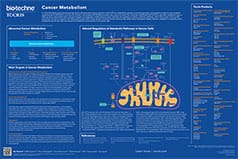Monocarboxylate Transporters
Monocarboxylate transporters (MCT) catalyze the bidirectional proton-linked transport of short-chain monocarboxylates such as L-lactate, ketone bodies and pyruvate across the plasma membrane of mammalian cells. MCT1-4 are key in the regulation of many cellular processes.
Monocarboxylate Transporter Inhibitors |
|
|---|---|
| Cat. No. | Product Name / Activity |
| 5658 | AR-C 141990 hydrochloride |
| MCT1 inhibitor | |
| 4960 | AR-C155858 |
| MCT1 and MCT2 inhibitor; inhibits glycolysis in cancer cells | |
| 7512 | 3-Bromopyruvate |
| MCT1 inhibitor; also inhibits hexokinase II | |
| 5029 | CHC |
| MCT inhibitor; decreases glycoloysis | |
| 5431 | SR 13800 |
| Potent MCT1 inhibitor | |
| 4186 | UK 5099 |
| MCT inhibitor; also inhibits mitochondrial pyruvate carrier | |
Monocarboxylate Transporter Blockers |
|
| Cat. No. | Product Name / Activity |
| 8008 | MSC 4381 |
| Potent and selective monocarboxylate transporter 4 (MCT4) inhibitor | |
There are 14 members of the solute carrier 16 (SLC16) gene family, four of which (SLC16A1, SLC16A3, SLC16A7 and SLC16A8) encode monocarboxylate transporters; MCT1, MCT4*, MCT2 and MCT3* respectively. MCTs have been shown to transport short-chain monocarboxylates such as L-lactate, ketone bodies and pyruvate across the plasma membrane of mammalian cells. MCTs have 12 transmembrane domains (TMDs) which consist of an intracellular N- and C-terminal and a large intracellular loop between TMDs 6 and 7. MCT1-4 require an ancillary protein either basigin or embigin, in order to express a fully functional protein at the plasma membrane.
MCTs are fundamental in the regulation of many processes including pH, respiration, glycolysis and gluconeogenesis. MCT1 is expressed in most tissues and facilitates lactic acid uptake for oxidation in cardiac and red skeletal muscle. MCT2 is a high affinity transporter; its expression is more limited than MCT1 and varies between species. MCT3 expression is confined to the basal membrane of the retinal pigment epithelium and choroid plexus epithelia. MCT4 is a low affinity transporter and is mainly expressed in highly glycolytic cells, such as white muscle fibers. Many cells can up regulate MCT4 expression under hypoxic conditions; this is mediated through transcriptional control by HIF-1α.
MCTs play a major role in the maintenance of the glycolytic metabolism through transport of lactate. MCT inhibitors have been shown to decrease glycolytic metabolism, migration and invasion, affect proliferation and induce cell death in certain cell lines. They are also useful tools for studying the Warburg effect.
*Note: MCT3 has the synonym MCT4 and MCT4 has the synonym MCT5; for further details please view Genecards.
External sources of pharmacological information for Monocarboxylate Transporters :
Literature for Monocarboxylate Transporters
Tocris offers the following scientific literature for Monocarboxylate Transporters to showcase our products. We invite you to request* your copy today!
*Please note that Tocris will only send literature to established scientific business / institute addresses.
Cancer Metabolism Research Product Guide
This product guide reviews some of the main areas in cancer metabolism research and lists around 150 products that can be used to investigate metabolic pathways in cancer including:
- Glycolysis
- Tricarboxylic Acid Cycle
- Lipidogenesis
- 1C Metabolism and Nucleic Acid Synthesis
- Drivers of Metabolic Reprogramming
- pH and Redox Balance
Cancer Metabolism Poster
This poster summarizes the main metabolic pathways in cancer cells and highlights potential targets for cancer therapeutics. Genetic changes and epigenetic modifications in cancer cells alter the regulation of cellular metabolic pathways providing potential cancer therapeutic targets.
Monocarboxylate transporters Gene Data
| Gene | Species | Gene Symbol | Gene Accession No. | Protein Accession No. |
|---|---|---|---|---|
| MCT1 | Human | SLC16A1 | NM_003051 | P53985 |
| Mouse | Slc16A1 | NM_009196 | P53986 | |
| Rat | Slc16A1 | NM_012716 | NP_036848 | |
| MCT2 | Human | SLC16A7 | NM_004731 | O60669 |
| Mouse | Slc16A7 | NM_011391 | O70451 | |
| Rat | Slc16A7 | NM_017302 | NP_058998 | |
| MCT3 (also know as MCT4) | Human | SLC16A8 | NM_004207 | O15427 |
| Mouse | Slc16A8 | NM_030696 | P57787 | |
| Rat | Slc16A8 | NM_030834 | NP_110461 | |
| MCT4 (also known as MCT5) | Human | SLC16A3 | NM_004696 | O15374 |
| Mouse | Slc16A3 | NM_146136 | Q8R0M8 | |
| Rat | Slc16A3 | NM_001013913 | NP_001013935 |

